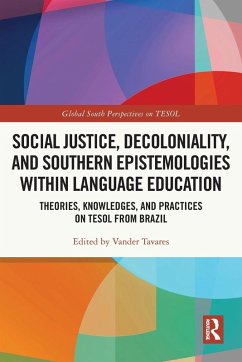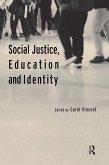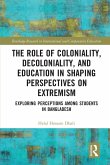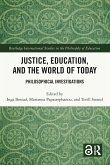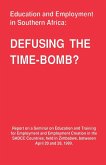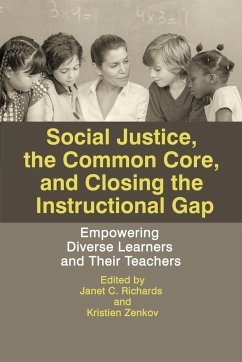Social Justice, Decoloniality, and Southern Epistemologies within Language Education
Theories, Knowledges, and Practices on TESOL from Brazil
Herausgeber: Tavares, Vander
Social Justice, Decoloniality, and Southern Epistemologies within Language Education
Theories, Knowledges, and Practices on TESOL from Brazil
Herausgeber: Tavares, Vander
- Broschiertes Buch
- Merkliste
- Auf die Merkliste
- Bewerten Bewerten
- Teilen
- Produkt teilen
- Produkterinnerung
- Produkterinnerung
With a strong focus on decoloniality and social justice, this volume brings together critical theories, concepts, and practices on TESOL from multiple Brazilian perspectives.
Andere Kunden interessierten sich auch für
![Social Justice, Education and Identity Social Justice, Education and Identity]() Social Justice, Education and Identity43,99 €
Social Justice, Education and Identity43,99 €![Global Crises, Social Justice, and Education Global Crises, Social Justice, and Education]() Global Crises, Social Justice, and Education57,99 €
Global Crises, Social Justice, and Education57,99 €![The Role of Coloniality, Decoloniality, and Education in Shaping Perspectives on Extremism The Role of Coloniality, Decoloniality, and Education in Shaping Perspectives on Extremism]() Helal Hossain DhaliThe Role of Coloniality, Decoloniality, and Education in Shaping Perspectives on Extremism57,99 €
Helal Hossain DhaliThe Role of Coloniality, Decoloniality, and Education in Shaping Perspectives on Extremism57,99 €![Justice, Education, and the World of Today Justice, Education, and the World of Today]() Justice, Education, and the World of Today56,99 €
Justice, Education, and the World of Today56,99 €![Education and Employment in Southern Africa Education and Employment in Southern Africa]() Education and Employment in Southern Africa58,99 €
Education and Employment in Southern Africa58,99 €![Social Justice, The Common Core, and Closing the Instructional Gap Social Justice, The Common Core, and Closing the Instructional Gap]() Janet C. RichardsSocial Justice, The Common Core, and Closing the Instructional Gap64,99 €
Janet C. RichardsSocial Justice, The Common Core, and Closing the Instructional Gap64,99 €![Configurations of Interdisciplinarity Within Education Configurations of Interdisciplinarity Within Education]() Trine ØlandConfigurations of Interdisciplinarity Within Education54,99 €
Trine ØlandConfigurations of Interdisciplinarity Within Education54,99 €-
-
-
With a strong focus on decoloniality and social justice, this volume brings together critical theories, concepts, and practices on TESOL from multiple Brazilian perspectives.
Produktdetails
- Produktdetails
- Verlag: Routledge
- Seitenzahl: 252
- Erscheinungstermin: 9. Oktober 2024
- Englisch
- Abmessung: 234mm x 156mm x 14mm
- Gewicht: 389g
- ISBN-13: 9781032365015
- ISBN-10: 1032365013
- Artikelnr.: 71623304
- Herstellerkennzeichnung
- Libri GmbH
- Europaallee 1
- 36244 Bad Hersfeld
- gpsr@libri.de
- Verlag: Routledge
- Seitenzahl: 252
- Erscheinungstermin: 9. Oktober 2024
- Englisch
- Abmessung: 234mm x 156mm x 14mm
- Gewicht: 389g
- ISBN-13: 9781032365015
- ISBN-10: 1032365013
- Artikelnr.: 71623304
- Herstellerkennzeichnung
- Libri GmbH
- Europaallee 1
- 36244 Bad Hersfeld
- gpsr@libri.de
Vander Tavares is a Postdoctoral Researcher in Education, Inland Norway University of Applied Sciences, Norway.
Introduction Part I: Social Justice through TESOL for and from the South
1. Digging up our Stones of Shame: English Language Education and Memories
of Brazil's Violent Past 2. Developing Critical Awareness of Indigenous
Languages and Cultures of Brazil in EFL Education: Children's Literature as
an Entryway Part II: Decolonizing Constructions of TESOL Teacher Education
and Educators 3. Reconstructing Our Teacher Selves through Decoloniality
and Southern Epistemologies 4. Teacher Education Practices within Pibid:
De/Re/Constructing What It Means to Be an English Educator Part III:
Southern-Based Knowledges and Pedagogies 5. Critical Tasks in Brazil:
Locally Produced Epistemologies and Praxis 6. Affect and English Language
Learning in the Global South: Literature-based Teaching Plans created by
Brazilian Teachers Part IV: (Re)Imagining TESOL through Brazilian
Perspectives 7. Thinking ELT Otherwise: Lessons from Decoloniality 8. A
Century of Paulo Freire: Problem-Solving Education, Conscientização,
Dialogue, and TESL from a Freirean Perspective Part V: Confronting the
Hegemony of the English Language in Research and Teaching 9. Realigning
Research Publication Practices in the South: Going Beyond the "Must Publish
in English" Controversy 10. Critical Perspectives of Brazilian Teachers on
English as a Lingua Franca: Rethinking Teaching through Critical Pedagogy
11. African and Afro-Brazilian Cultural Themes as Possible Paths Towards
Decolonizing English as a Foreign Language Education
1. Digging up our Stones of Shame: English Language Education and Memories
of Brazil's Violent Past 2. Developing Critical Awareness of Indigenous
Languages and Cultures of Brazil in EFL Education: Children's Literature as
an Entryway Part II: Decolonizing Constructions of TESOL Teacher Education
and Educators 3. Reconstructing Our Teacher Selves through Decoloniality
and Southern Epistemologies 4. Teacher Education Practices within Pibid:
De/Re/Constructing What It Means to Be an English Educator Part III:
Southern-Based Knowledges and Pedagogies 5. Critical Tasks in Brazil:
Locally Produced Epistemologies and Praxis 6. Affect and English Language
Learning in the Global South: Literature-based Teaching Plans created by
Brazilian Teachers Part IV: (Re)Imagining TESOL through Brazilian
Perspectives 7. Thinking ELT Otherwise: Lessons from Decoloniality 8. A
Century of Paulo Freire: Problem-Solving Education, Conscientização,
Dialogue, and TESL from a Freirean Perspective Part V: Confronting the
Hegemony of the English Language in Research and Teaching 9. Realigning
Research Publication Practices in the South: Going Beyond the "Must Publish
in English" Controversy 10. Critical Perspectives of Brazilian Teachers on
English as a Lingua Franca: Rethinking Teaching through Critical Pedagogy
11. African and Afro-Brazilian Cultural Themes as Possible Paths Towards
Decolonizing English as a Foreign Language Education
Introduction Part I: Social Justice through TESOL for and from the South
1. Digging up our Stones of Shame: English Language Education and Memories
of Brazil's Violent Past 2. Developing Critical Awareness of Indigenous
Languages and Cultures of Brazil in EFL Education: Children's Literature as
an Entryway Part II: Decolonizing Constructions of TESOL Teacher Education
and Educators 3. Reconstructing Our Teacher Selves through Decoloniality
and Southern Epistemologies 4. Teacher Education Practices within Pibid:
De/Re/Constructing What It Means to Be an English Educator Part III:
Southern-Based Knowledges and Pedagogies 5. Critical Tasks in Brazil:
Locally Produced Epistemologies and Praxis 6. Affect and English Language
Learning in the Global South: Literature-based Teaching Plans created by
Brazilian Teachers Part IV: (Re)Imagining TESOL through Brazilian
Perspectives 7. Thinking ELT Otherwise: Lessons from Decoloniality 8. A
Century of Paulo Freire: Problem-Solving Education, Conscientização,
Dialogue, and TESL from a Freirean Perspective Part V: Confronting the
Hegemony of the English Language in Research and Teaching 9. Realigning
Research Publication Practices in the South: Going Beyond the "Must Publish
in English" Controversy 10. Critical Perspectives of Brazilian Teachers on
English as a Lingua Franca: Rethinking Teaching through Critical Pedagogy
11. African and Afro-Brazilian Cultural Themes as Possible Paths Towards
Decolonizing English as a Foreign Language Education
1. Digging up our Stones of Shame: English Language Education and Memories
of Brazil's Violent Past 2. Developing Critical Awareness of Indigenous
Languages and Cultures of Brazil in EFL Education: Children's Literature as
an Entryway Part II: Decolonizing Constructions of TESOL Teacher Education
and Educators 3. Reconstructing Our Teacher Selves through Decoloniality
and Southern Epistemologies 4. Teacher Education Practices within Pibid:
De/Re/Constructing What It Means to Be an English Educator Part III:
Southern-Based Knowledges and Pedagogies 5. Critical Tasks in Brazil:
Locally Produced Epistemologies and Praxis 6. Affect and English Language
Learning in the Global South: Literature-based Teaching Plans created by
Brazilian Teachers Part IV: (Re)Imagining TESOL through Brazilian
Perspectives 7. Thinking ELT Otherwise: Lessons from Decoloniality 8. A
Century of Paulo Freire: Problem-Solving Education, Conscientização,
Dialogue, and TESL from a Freirean Perspective Part V: Confronting the
Hegemony of the English Language in Research and Teaching 9. Realigning
Research Publication Practices in the South: Going Beyond the "Must Publish
in English" Controversy 10. Critical Perspectives of Brazilian Teachers on
English as a Lingua Franca: Rethinking Teaching through Critical Pedagogy
11. African and Afro-Brazilian Cultural Themes as Possible Paths Towards
Decolonizing English as a Foreign Language Education

